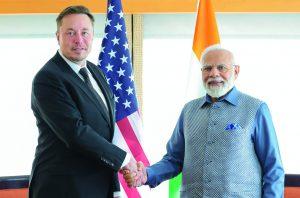BLOOMBERGÂ
Indian Prime Minister Narendra Modi’s trip to the US couldn’t have come at a better time. A buzzing economy, equity benchmarks at record highs and a rapidly growing consumer market all make for a great advertisement as he pitched the country’s potential to American corporate executives and investors.
Stocks in India have lured almost $10 billion in net foreign inflows since March, set to be the most in any quarter since the end of 2020. Rupee-denominated bonds are on track to witness the longest streak of monthly buying by overseas funds in almost four years, while the local currency is offering the second-best carry returns in Asia this year, according to Bank of America.
Modi’s visit promises more: Tesla Inc is likely to make a significant investment in India, Chief Executive Officer Elon Musk said after meeting the South Asian nation’s leader, who also urged Bridgewater Associates founder Ray Dalio to deepen investments in the country. General Electric Co and Hindustan Aeronautics are likely to sign an agreement during Modi’s trip to produce engines for India’s fighter jets. “Investors agree that India is passing through a ‘Goldilocks’ phase,†Samiran Chakraborty and Baqar Zaidi, economists at Citigroup Inc, wrote in a note after meeting equity and fixed-income investors in London.
The gush of foreign money and a retail-investing boom brought about by the pandemic have propelled India’s benchmark NSE Nifty 50 Index to all-time highs, with the gauge up almost 9% this quarter.
While that’s made stocks expensive relative to history and raised the premium they typically command over emerging-market peers, the allure of steady economic, political stability and a supportive monetary policy is keeping investors enthused.
These attributes make the nation of 1.4 billion people stand out amid a slowing global economy, with its appeal burnished by China’s tepid post-pandemic recovery and its tensions with the West.
Investors seem willing to hold on to their ‘long’ India positions despite rich valuations, the Citi economists wrote. “There was no discerning fear of any immediate reversal of these portfolio flows.â€
 The Gulf Time Newspaper One of the finest business newspapers in the UAE brought to you by our professional writers and editors.
The Gulf Time Newspaper One of the finest business newspapers in the UAE brought to you by our professional writers and editors.
